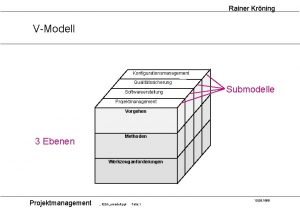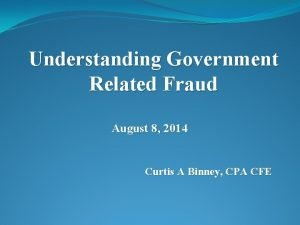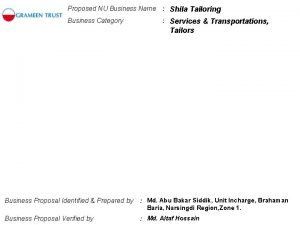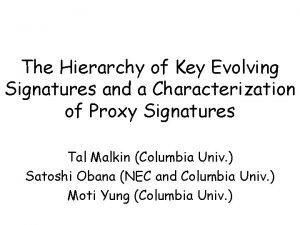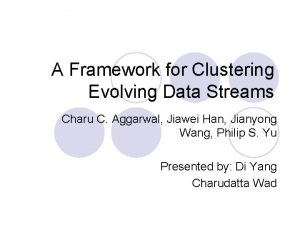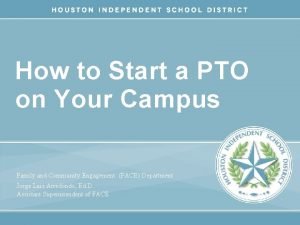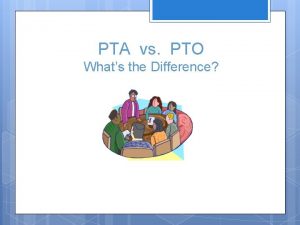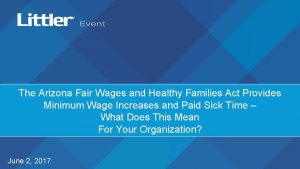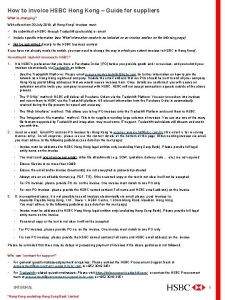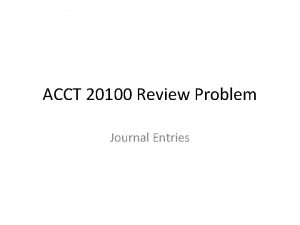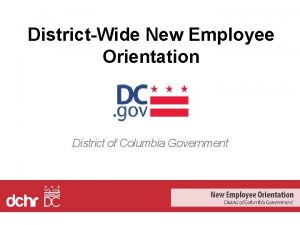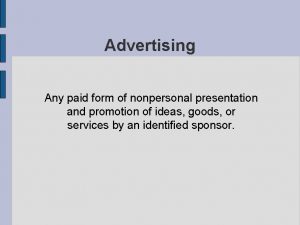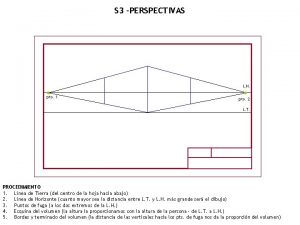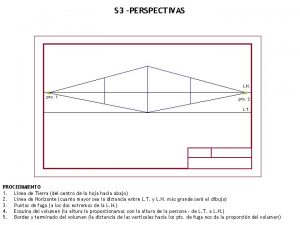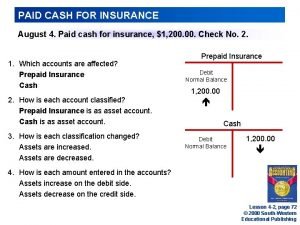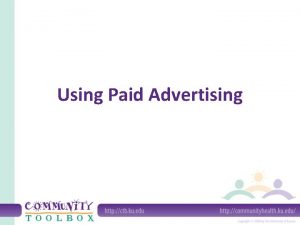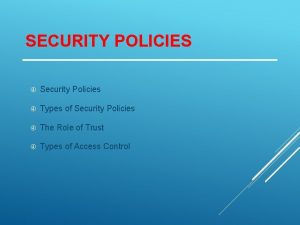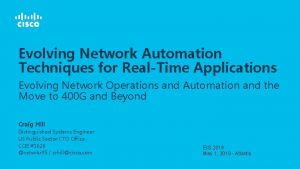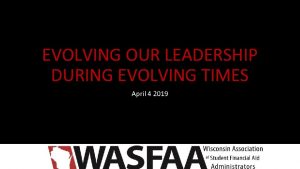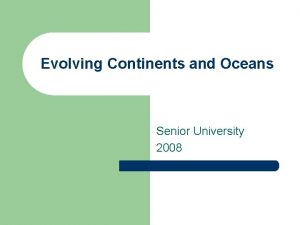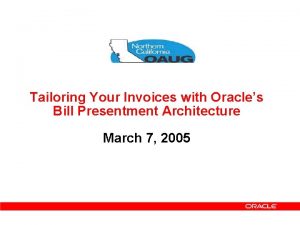TAILORING YOUR PTO POLICIES TO YOUR EVOLVING PAID


































- Slides: 34

TAILORING YOUR PTO POLICIES TO YOUR EVOLVING PAID SICK LEAVE OBLIGATIONS Lisa Stephanian Burton Corrie Fischel Conway Michelle Seldin Silverman © 2015 Morgan, Lewis & Bockius LLP

Join the Discussion! @xperthrusa #XHRLive Have a question? Ask us during the presentation using the chat box.

SIZING UP THE ADA: What Is Required? © 2015 Morgan, Lewis & Bockius LLP 3

ADA Refresher • Americans with Disabilities Act (ADA) requires that employers provide reasonable accommodation for an individual with a “disability” 4

ADA Refresher • Disability: Physical or mental impairment that substantially limits one or more major life activities – Includes impairments that are episodic or in remission – Without regard to mitigating measures – 2008 ADAAA broadly expanded the definition of “disability” • Qualified individual with a disability: Can perform the essential functions of the job with or without reasonable accommodation • Reasonable accommodation: Only needs to be provided to the extent it does not create an undue hardship for the business 5

2009 Amendment: ADAAA • The term disability now must be construed “broadly in favor of expansive coverage. ” This is not meant to be a “demanding” standard to meet. • An impairment is a disability if it substantially limits a person’s ability to perform a major life activity as compared to most people in the general population. • An impairment just needs to substantially limit the ability to perform an activity—it does not have to prevent or even significantly or severely restrict the activity. 6

ADAAA Understanding New Definition of Disability • Certain conditions will now “virtually always” meet the definition of disability: – Deafness, blindness, intellectual disability, missing limbs, mobility impairments (requiring use of wheelchair), autism, cancer, cerebral palsy, diabetes, epilepsy, HIV/AIDS, multiple sclerosis, muscular dystrophy, major depression, bipolar disorder, obsessive-compulsive disorder, post-traumatic stress disorder (PTSD), autism, and schizophrenia. • EEOC says this assessment should be “simple and straightforward. ” 7

ADAAA Understanding New Definition of Disability • “Regarded as” disabled: – Old standard: Employee had to show impairment that substantially limited a major life activity. – New standard: Merely show that the employer perceived employee to be impaired. – Does not include transitory and minor impairments lasting less than six months (like the common cold). 8

The Regulations Make Clear • Employers may not make it unduly burdensome for employees to show that they have a disability. • While an employer may request documentation to support the existence of a disability and/or need for an accommodation, it should be very limited if the disability is obvious or known. • Employers must have a robust accommodation process in place that meets the obligation to engage in the “interactive process. ” This includes having policies and procedures in place to notify employees with disabilities of accommodation processes. • Everyone, including managers and supervisors, must understand their obligation to make employment decisions based upon objective business facts without regard to an individual’s impairment. 9

The Five Steps of the Interactive Process Step 1: Recognizing an Accommodation Request Step 5: Monitoring the Accommodation Step 2: Gather Information As Necessary Step 3: Evaluate Options and Choose an Effective Accommodation Step 4: Implementing the Accommodation 10 10

What Kinds of Accommodations Might Be Required? Reasonable modifications to a work schedule Reallocation or redistribution of marginal (nonessential) functions Changes to the physical space of an employee’s work space Extra breaks Leaves of absence/time off Reassignment 11

FMLA Refresher • Family Medical Leave Act (FMLA) provides 12 workweeks of unpaid leave to eligible employees during a 12 -month period for one or more of the following reasons: – Serious health condition that makes employee unable to perform his/her job; – Care of an immediate family member with a serious health condition; – Broadened definition of “spouse” – – – Birth and care of a newborn child; Incapacity due to pregnancy, prenatal medical care, or childbirth; Placement of a son or daughter for adoption or foster care; Qualifying exigency related to military service; and/or Care for a covered service member with serious injury or illness (26 -week entitlement) • DOL regulations detail notice and certification requirements • DOL regulations address substitution of paid leave and interplay with disability benefits 12

IMPACT OF PAID SICK LEAVE LAWS: One Size Does Not Fit All © 2015 Morgan, Lewis & Bockius LLP 13

Paid Sick Leave Under State/Local Laws • State paid sick leave mandates: – Require employers to grant to employees minimum amounts of paid sick leave to be used for qualifying reasons – Vary by jurisdiction on eligibility, accrual, amount of entitlement, notice provisions, certification requirements, and covered reasons – But some geographic similarities 14

Common Provisions of Mandated Paid Sick Leave Laws • Accrued but unused sick leave usually can be carried over year to year • Cap on annual accrual of sick leave time • Payout of accrued but unused sick leave time generally not required • Use of leave by employee or covered family members/dependents for general health reasons – Illness, injury, or health condition – Medical diagnosis, care, or treatments – Preventive medical care • Some jurisdictions specifically provide leave for domestic/family violence, sexual assault, stalking • Employer may not require, as a condition of taking paid sick time, that the employee secure a replacement worker 15

Common Provisions of Mandated Paid Sick Leave Laws • Most jurisdictions have broad definitions of “family member” – Some recognize “committed relationships” involving cohabitation • Employee notice to employers – 7 – 10 days foreseeable leave – Otherwise, typically as soon as practicable • Typically certification for leave of three consecutive days or more • Poster and/or individual employee notification – Translations in other languages may be required based on workforce – Agencies tasked with administering the laws may or may not issue template forms of notices and posters • Recordkeeping • Antiretaliation • Some permit waiver by CBA 16

MEASURING YOUR LEAVE POLICY: Where to Start and Common Errors © 2015 Morgan, Lewis & Bockius LLP 17

Complications Arising from Paid Sick Leave Acts • PTO policies meant to cover an employer’s obligations under the applicable sick time law can be complicated, particularly for employers operating in multiple jurisdictions with applicable acts. – Must ensure that all employees (including part time and temporary employees) are covered to the extent mandated by the applicable act. – Must be sure PTO can be used for same reasons and under same circumstances as mandated sick time for all applicable acts. – Cannot require advance notice in most paid sick time jurisdictions. – Some paid sick time laws require employers to track accrual and use, and to provide this information to the employee (e. g. , California). – Must be sure you are following carryover rules and accrual rates. Be careful with part-time workers— 50% schedule does not necessarily calculate to 50% earned sick time. 18

Complications Arising from Paid Sick Leave Acts • “Unlimited” sick time policies become complicated in jurisdictions with paid sick time laws. – Must ensure that the sick time policy allows time to be used for all of the reasons and under the same circumstances permitted by the applicable act(s). – Must ensure that employees are not disciplined for using “excessive” sick time if the amount used is under that mandated by the act(s). – Cannot discipline employees for using too many days in a certain period of time until they have exhausted the mandated amount. 19

Complications Arising from Paid Sick Leave Acts • Be cautious of policies that require an employee to apply for STD benefits after only a short number of sick days. – Ensure that employees are not required to provide documentation in excess of that required by any applicable sick time act. – Be careful to ensure that, if STD is ultimately denied, employees are not required to take days unpaid that should have been covered by an applicable paid sick time act. • Be careful to ensure that correct notices are provided for each of the jurisdictions in which the company operates. • Be mindful of employees that could be covered by multiple paid sick time acts. 20

Interaction with the FMLA • Paid sick time laws generally allow paid time off to be run concurrently with FMLA. – Employers may generally apply terms and conditions applicable to use of leave. • However, it is the employer’s burden to determine whether the paid time will be FMLA-protected. • If the employer has reason to believe that the paid sick time was used for a reason also covered by the FMLA, the employer should give FMLA-required notices and request a certification. • Most paid sick time laws permit the employer to request a certification if the time is protected by the FMLA, even if the certification requires information in excess of that permitted by paid sick time acts. The same is not necessarily true for STD. • If disability benefits, workers’ compensation, or other wage replacement benefits are received, the general “substitution” rules may not apply unless there is an employer-employee agreement. 21

Is Federal Paid Sick Leave on the Horizon? • Presidential Memorandum: Modernizing Federal Leave Policies for Childbirth, Adoption and Foster Care to Recruit and Retain Talent and Improve Productivity (Jan. 15, 2015) – Directed federal agencies to provide up to six weeks of paid leave following the birth or adoption of the child or for other sick leave eligible uses • Healthy Families Act – Introduced in Senate on February 12, 2015 – Would require employers who employ 15 or more employees to accrue up to one hour of paid sick time for every 30 hours worked, up to seven days a year – Obama’s endorsement of the Act and call for states to enact similar legislation has already created a flurry of local legislative activity. Expect to see even more paid sick leave acts and ordinances introduced in the next few years. 22

INCORPORATING YOUR CHANGING COMPLIANCE OBLIGATIONS: Finding the Right Fit © 2015 Morgan, Lewis & Bockius LLP 23

Sum-up: Leave Rights and Considerations Are Not Just About the FMLA and ADA. . . • State paid leave laws may have differences including different eligibility criteria, amount, coverage, notice, entitlement to leave for domestic partners, entitlement to leave that does not run concurrently with FMLA, and certification requirements. • State adoption or pregnancy and childbirth laws may provide broader eligibility for leave than the FMLA or additional or different leave, or specific nondiscrimination provisions. • Certain disability accommodation issues may be state-specific. – Pregnancy disability leave may be required as well in some jurisdictions. • State workers’ compensation laws may extend leave, provide benefits, impact decisions with return to work, and/or provide notice that FMLA is needed. 24

Sum-up: Leave Rights and Considerations Are Not Just About the FMLA and ADA. . . • State disability benefit mandates • HIPAA/GINA • FLSA and state wage and hour rules – Cash-out of paid leave – Deduction issues when an employee exhausts leave • Interaction with company policies and voluntary disability plans 25

Establishing Terms and Conditions of a Paid Leave Policy • Make sure minimum jurisdictional requirements are incorporated if in the “employee’s” favor • If greater leave is provided, determine if additional terms and conditions may apply beyond those permitted by law • Ensure that managers understand that paid sick leave mandated by law also is “protected” by law 26

The Right Program for Your Organization • State and Local Compliance – Stay ahead of uptick in legislation mandating paid sick leave. . . what jurisdictional requirements currently apply? • Financial Considerations – State laws may require payout of unused leave depending on type offered • Employee Relations Considerations – How will the most qualified candidates for a position perceive leave plan? – Leave culture. . . population likely to abuse leave? 27

The Right Program for Your Organization • Legal Compliance – Remember, it is not enough to simply provide a specific number of days – Must comply with notice provisions, certification requirements, covered reasons, etc. • Multistate employers must consider how to structure programs to comply with varying state and local mandates – Same considerations come into play with unpaid state leave laws – Consider employee relations and administrative issues 28

Structuring Paid Leave to Prevent Abuse • Impose and clearly communicate terms and conditions for using paid leave to all employees – Provide and enforce specific notice, certification, and documentation requirements – Retain discretion to request additional information when permitted by law • Determine how much leave to provide over and above legal mandate • Determine if a “bucket” of leave for any reason will result in less abuse than separate “buckets” 29

Insufficient Employee Notice • While employers are responsible for determining if the FMLA might be in play, courts have held that employers are not expected to be mind readers. – A text message stating that an employee’s father was in the emergency room and the employee needed the night off, without more information, was insufficient notice of the need for FMLA. – An employer need not assume that all of an employee’s absences are linked to the employee’s previously certified serious health condition. • Best Practice: When in doubt, HR should ask questions to ensure that the company has enough information to determine whether an absence may be FMLA protected. 30

Incorporating Mandatory Paid Sick Leave into Voluntary PTO Policies • Considerations if PTO policy is already in place – – Compliance with requirements of mandated paid sick leave Wide range of entitlements across jurisdictions mandating paid sick leave Are equivalent leave entitlement and benefits provided under PTO policy? Compliance with applicable requirements? • Reducing PTO to comply with mandated paid sick leave may be viewed as reducing employee benefits creating employee relations issues 31

Best Practices and Considerations When Managing Leave in the Workplace • Consider all legal obligations • Determine what is best policy approach, balancing multiple state/local obligations with national policy approach • Consider employee relations issues • Ensure that all managers and those charged with implementation and enforcement of policies are properly trained and understand the tools that can and cannot be used if abuse is suspected 32

Your Presenters Lisa Stephanian Burton One Federal Street Boston, MA 02110 Phone: +1. 617. 341. 7725 Fax: +1. 617. 341. 7701 E-mail: lburton@morganlewis. com Corrie Fischel Conway 1111 Pennsylvania Ave. , NW Washington, DC 20004 Phone: +1. 202. 739. 5081 Fax: +1. 202. 739. 3001 E-mail: cconway@morganlewis. com Michelle Seldin Silverman 502 Carnegie Center Princeton, NJ 08540 -6289 Phone: +1. 609. 919. 6660 Fax: +1. 609. 919. 6701 E-mail: msilverman@morganlewis. com 33

Thank You! Contact us at 1 -855 -XPERTHR or inquiries@xperthr. com Learn more at: http: //www. xperthr. com
 Walmart pto accrual rates 2021
Walmart pto accrual rates 2021 Tailoring projektmanagement
Tailoring projektmanagement Aeroelastic tailoring
Aeroelastic tailoring Bid tailoring scheme
Bid tailoring scheme History of tailoring
History of tailoring Mc tailoring
Mc tailoring Tailoring business proposal
Tailoring business proposal Tailoring strategies to fit specific industry
Tailoring strategies to fit specific industry Key evolving signature
Key evolving signature Evolving
Evolving Evolving design
Evolving design A framework for clustering evolving data streams
A framework for clustering evolving data streams Pto training course
Pto training course Pump pto taki
Pump pto taki Pto startup toolkit
Pto startup toolkit Pta vs pto
Pta vs pto Closter pto
Closter pto Prop 206 arizona pros and cons
Prop 206 arizona pros and cons Make questions in the present perfect
Make questions in the present perfect What is a paid form of communication
What is a paid form of communication Should college athletes be paid thesis statement
Should college athletes be paid thesis statement Paid cash to owner for personal use
Paid cash to owner for personal use Recived cash from sales
Recived cash from sales Facture paid invoice receipt via hsbc
Facture paid invoice receipt via hsbc Dgp week 17
Dgp week 17 The incomparable price jesus paid for me
The incomparable price jesus paid for me Which act taxed colonists without their consent? *
Which act taxed colonists without their consent? * Licensing sports marketing
Licensing sports marketing Paid rent for the month debit or credit
Paid rent for the month debit or credit Salaries paid in cash flow statement
Salaries paid in cash flow statement 441 4th street nw
441 4th street nw Past perfect liste
Past perfect liste Zids and zods answers
Zids and zods answers Is any paid form of nonpersonal presentation
Is any paid form of nonpersonal presentation Paid surveys slovenia
Paid surveys slovenia

